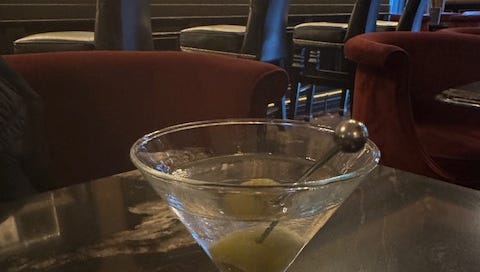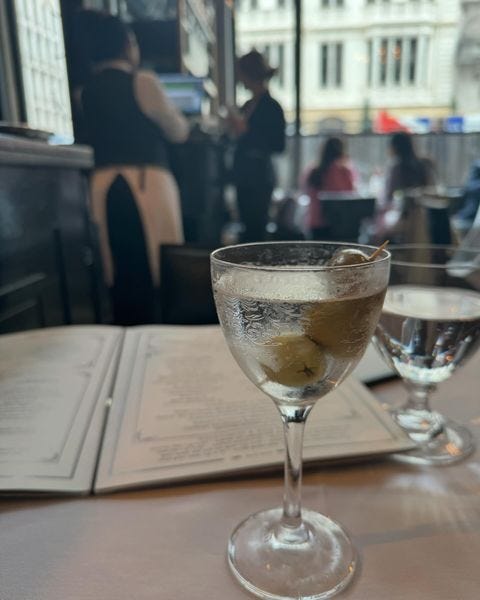There was a photo of a woman on Instagram. She was not in it. It was just her drink, a clean, crisp, cold martini, three olives on a stick. There was a blurred waitress in the background, an open menu in front of her, an order about to be placed. “Woman eats and drinks alone,” said the caption.
I am looking at it again, pondering why I keep looking at it when an alarm blasts on my phone. It is shrill and sharp, gradually increasing in volume. It penetrates my skull, but I am not lost. I do not need to be found. A Find my iPhone alert has been activated because I have not answered my mobile quickly enough. I have left it on silent because I do not want to be disturbed, because I am reading, because I am spending time with me. I have left my children to fend for themselves. They have food, a credit card, a vehicle, a roof over their head. They were invited to join me for a few days by the sea, but it’s exam season. They are midst GCSEs and A-levels, and they have their futures to consider. There are whiteboards propped against windows. There are folders spread across tables. There are post-it-notes stuck to the shower. I have prepared snack boxes to support their revision schedule. I have taken orders from nine other girls who are not mine. I want a badge for my enthusiastic mothering. My daughters don’t want to come with me, but they don’t want me to leave them either. They send me messages to remind me I have left them.
There are events for women like me, sessions where I could learn how to better parent teenagers as they traverse from childhood into adolescence. I could make notes on how to be somewhere between authoritarian and laissez-faire, somewhere between their buddy and their boss. I am not supposed to invade their privacy. I am supposed to respect their boundaries. I shouldn’t be soft. I shouldn’t be strict. I must be a quiet but constant presence. I must not disregard their rights. I should not approach them looking for information. I should be available in case they are looking for me. I should sit there casually waiting to be needed like a drama paused at the best bit and some day, I might be allowed to press play again.
“What happens if you don’t want to use your gifts?”. My allocation of controversial questions has already been exceeded and my neighbour says I must not ask another. I am starting to stress the facilitators. I’m not talking about special powers like sorcery or teleportation or omnikinesis although I have told my husband that I think I can see right through people and out the other side. I am attending a course. We have been filling in questionnaires, assessing our divinely allocated spiritual gifts. We can self-assess and ask two or three others to evaluate us. I decide I don’t trust anyone bar my husband. He gives me zero for the gift of helping. I get a small number of points for compassion. He underlines building relationships and writes “depends on the people” beside it. I don’t reassure and strengthen those who are discouraged. I don’t motivate anyone. I get top marks for hospitality and admin, but I don’t want to do hospitality and admin. These special abilities I have been gifted should be used to serve others for the common good of the church. I can’t begin to imagine the sins I am committing by not putting myself forward anymore for spreadsheets and emails and one-pot suppers. I should be growing in selflessness not regressing into selfishness. My neighbour looks at my answers. “Do you have any mercy?” she asks.
In her foreword for the new edition of Falling Upward1, Brené Brown talks about spiritual homesickness, her regular longing for the home of her own soul. “It was a reoccurring desperation to find a sense of sacredness within me, not outside of me: my soul, my home, God in me. It was homesickness for a place that exists only inside me,” she says. She used to succumb to the yearning, drop everything and run as fast as she could to visit the home within her. “The door to my internal spiritual home would be one simple experience, one encounter with a thin place - maybe sitting in my car listening to Loretta Lynn sing “How Great Thou Art,” or an afternoon swim with God in Lake Travis, or one night praying the Daily Examen”. Now she’s no longer interested in making it a quick visit and running back to the world of “what other people think” and “what I can get done”. Now she can barely be dragged out of the house because she wants to stay in her sacred space.
I decide motherhood is not my gift. It requires mercy. It is fuelled by hospitality and admin. It never leaves me alone. It disrupts my inner world. There is a reason why I constantly need a break from it. All the mothers at the course seem to share the same gifts - hospitality and admin. “Do you think it’s a woman thing?” they say. There is no mention of gender bias or conditioning or duty or guilt when it comes to these gifts. None of us have the leadership gift but as admin-ers, we are told we should be open to adjusting our plans, so we don’t stifle a leader’s vision. I picture a secretary, a Dolly Parton in 9 to 5, standing up to a vice-president and I reckon this not stifling a leader’s vision could only have been written by a man. I rue the failure to see the prophetic in the one who manages details.
In Rachel Cusk’s novel, Arlington Park, Juliet teaches English at Arlington High. Her last lesson finishes at half past three. At the same time, half-a-mile away at Arlington Primary, the white-faced teachers are opening the doors and releasing her children. At the sound of the bell, she abandons her class, runs down the waxed corridors, runs out through the gates and into the street. She runs along the pavements clutching her bag of exercise books. She arrives breathless to collect them, sweat cascading down her sides. On the last Friday of the month, she takes the after-school literary club. For a whole hour, she presents herself to pubescent girls. She discusses matters of a higher order. She is half warning, half enigma. “You will never understand me, she seemed to say; and at the same time, this is what one day you might become”.
“These Fridays were like a dividend from which she eked out a whole secretive life. On those days, Juliet did not run. Benedict collected the children”.
And I think I kept looking at the photo of the woman on Instagram2 because sometimes a woman has to leave so she can open the door and breathe in her own internal spiritual home.
Falling Upward by Richard Rohr.






Such a good piece. 👌Saving to re-read.
That first paragraph! 👌I want to read the whole novel!
Love your writing on evolving womanhood and midlife and mothering. The sense of loss and conflicted obligations and dissappearing identity.